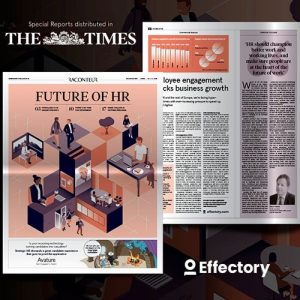Before answering the question if Job Crafting really affect employee well-being or if it is just a new hip term, it is important to mention what this new concept is really all about and how it is relevant to the new world we are living in.
If autonomy no longer suffices: try Job Crafting!

Job Crafting reflects the needs of contemporary work environment
The concept of Job Crafting has existed for two decades, but HR professionals started to acknowledge its merits only recently. Job Crafting can shortly be explained as restructuring your work environment, and aligning it with your skills, values, preferences, and expectations. In other words, doing things you like, the way you would feel most fulfilled and satisfied. Sounds very ambitious, doesn’t it? After all, how many of us really get the chance to create our “dream job”? Well, get ready to be surprised, because one out of three employees in the Netherlands actually got the chance to do so. Now, how did they get there? Let’s take a closer look.
There are three common ways in which employees craft their every day operations:
-
Task crafting: Irene works in Sales. She expands her knowledge, develops skills and abilities in ways that, according to her, allow her to boost her performance. She learns how to use new online tools to increase her outreach, develops strategies by thinking out of the box, and finds solutions to contractual issues. She basically crafts her tasks so she can offer enhanced service. She does so by changing the way she undertakes her tasks, re-evaluating what tasks are fulfilled to what extent and how much energy is spent on certain tasks.
-
Relationship crafting: Charly works as a project manager. He is new to the job, so he wants to sharpen his skills. He is building a network with experienced project managers and asks for feedback on a weekly basis regarding his approach and attitude towards to his clients. Furthermore, he gains insight into how his fellow project managers build good connections with their customers. Subsequently, he determines what coworkers he needs to approach, how to do so, and what kind of a work relationship he needs to build with them. Consequently, he is able to perform like his fellow, experienced, project managers quickly and in a way that makes him feel comfortable.
- Cognitive crafting: Danny works in the IT department and he is responsible for all information security. Although his daily operation is to protect data by creating a trustworthy cybersecurity environment, he sees it as something more. He feels personally responsible for the protection of his coworkers’ and clients’ personal information and data. He believes that by going the extra mile he contributes to cybersecurity awarenes around the world, which he thinks is a very sensitive issue. He thinks that he is making the world a safer place. In short, he has changed the way he perceives his job, and has expanded the impact, as a consequence of which, it has become more meaningful to him. This has lead him to experience more pride and satisfaction in what he does.
It does not look all that impossible, right? By facilitating task flexibility, enhancing role descriptions, and enabling advanced colleague interaction, you can also introduce a job crafting culture in your organization.
The Future of HR Special Report
Technology is changing how HR will function in the future. This report explores the impact of AI & big data plus how to use employee engagement for growth.
DownloadFrom autonomy to job crafting for ultimate success!
What is the added value, then? How is it different than increasing autonomy? Well, first of all, job crafting is a way of proactively reorganizing your organization to better suit the needs of individuals. Whereas, just working autonomously might just give you the freedom to prioritize tasks and content. So, a job crafting employee makes fundamental changes about what to do, how to do, and whom to incorporate for ultimate success. Our statistical analyses support the added value of job crafting. We found that job crafting employees are 6% more engaged than employees who only experience autonomy. This is a result of the enhanced mindset job crafters develop.
Job crafting initiates finetune the approach of their tasks, have a more work-centered state of mind, find creative solutions to problems, and provide each other with feedback. By doing so, they actually create a work environment in which they feel that their skills are being valued. In other words, they coordinate and craft their work to make it more meaningful to them. As a result, our survey results highlight that crafters score 18% higher on psychological safety, 17% higher on engagement and commitment, and 15% higher on efficiency than non-crafters. These findings show that it is hard to argue against the merits of job crafting.
How does this impact your organization?
Previous research shows us that job crafting has a significant impact on your organization. It improves the work relationship between colleagues, encourages people to apply, based on skills and characteristics, and it gives employees additional freedom by simply trusting their qualities and work methods. Such a positive work environment can cause employees to have an increasing amount of energy, positive emotions, and more commitment to their job. As a result, studies show, crafting employees are performing better and they are less likely to leave an organization where they feel like they are functioning well, where they feel at home and at ease.
The changes needed for working more towards an environment where people can create their own jobs, can easily be embedded in daily operations. Effectory offers a validated instrument to measure the level of job crafting in your organization and our consultants are ready to give advices on how to enhance it. Would you like to know more? Please contact us!
Employee Engagement
Increase employee engagement through action-oriented feedback. Using a single platform, you can collect reliable data, analyze the results, and share insights.
view employee survey solution